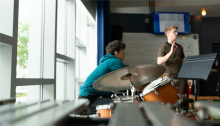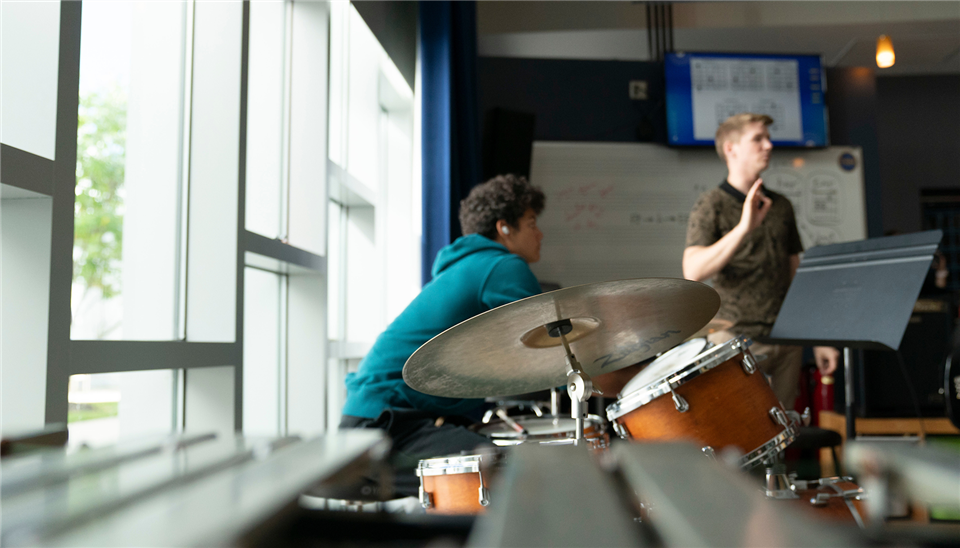
Music teacher Charlie Baker, in his first year at Field, provides a deeper look into how music students at Field are given tools and support to push the limits of contemporary music education.
In the ever-evolving landscape of education, music programs face the challenge of adapting to our modern culture of music. Worldwide, innovations in music education have lagged several decades behind similar advances in other subjects. But while traditional large-ensemble music classes like band, choir, and orchestra have long been a staple in schools, there is growing recognition of the need to incorporate contemporary music practices into the classroom. As a classically-trained musician and music educator, I have searched for ways to better connect my students to the thriving music industry here in the United States. My search led me to the music studio at The Field School, where classes give students the skills and spaces they need to become modern musicians. I was excited to add my voice to a community ready and willing to try new approaches to music education and to keep students inspired to reach for musical excellence and authenticity.
As music programs in DC and around the country recover from the recent pandemic, we have an opportunity to seek out the most educationally and artistically inspiring ways for students to engage with music. Whether that means learning an instrument, exploring aspects of music production and recording, composing original music, or a combination of these skills, students at Field are pushing the limits of what is possible for a school music program. As we prepare for the Winter Concert and Visual Arts Exhibition, I encourage you to explore some of the core tenets of our music program:
Relevance to Students' Lives
Contemporary music reflects the current cultural and social landscape, making it more relatable for students. Most students are not jamming out to Mozart and Mahler; they are more interested in the latest release on Spotify or Apple Music. Integrating songs from various genres, including pop, rock, jazz, hip-hop, and electronic music, ensures that students are engaged with the material on a personal level.
Individualized Learning and Personal Expression
School music ensembles often focus on collective performance, just as our music students have this fall. But in the spring, Field students will begin to use the full capabilities of our recording studio. In a recording studio, students can explore and express their unique musical identities. Sammi ‘25, a singer in advanced music, has been working on finishing her first EP release. The class was excited to include one of her songs in the Winter Concert where it will be performed live for the first time! Whether it's crafting original compositions, experimenting with different instruments, or fine-tuning vocals, the studio allows for personalized learning that nurtures creativity and self-expression.
Cultural Relevance and Inclusivity
In my experience, traditional music education may inadvertently exclude certain cultures or communities. With much of the existing lexicon coming from the Western European musical tradition, only recently have other voices begun to contribute. Contemporary music, with its wide array of influences, embraces diversity and allows for a more inclusive representation of various musical traditions. This approach helps bridge cultural gaps and promotes understanding of a variety of life experiences.
Technology as a Creative Tool
The music studio is a playground of technological possibilities. From digital audio workstations (DAWs) to a plethora of recording equipment, students can harness technology to sculpt their sound. This integration not only demystifies the technical aspects of music production but also empowers students with skills that are increasingly valuable in the modern music landscape. Henry ‘27 has been using the vocal isolation booth in the studio for his work in the Music Production & Recording club, where he collaborates with peers to create beats and mixes.
Versatility Across Genres
Traditional music classes often focus on specific genres or styles. In a recording studio, the possibilities are limitless. Students can explore and blend genres, experimenting with various elements to create a unique sonic signature. This versatility not only broadens their musical horizons but also reflects the diversity of the modern music scene.
Collaborative Learning Dynamics
Music studios like ours naturally foster collaboration. Field students work together on projects, sharing ideas and contributing to the production process. This collaborative approach mirrors the dynamics of the music industry, where teamwork is essential. Students develop interpersonal skills crucial for successful collaborations in their future musical endeavors through these shared experiences.
Industry-Relevant Skills Development
Learning in our studio ensures that students acquire skills directly applicable to the music industry. From recording and mixing to understanding studio etiquette, Field music students graduate with a practical skill set that positions them for success in an industry where technical proficiency is highly valued.
As education continues to evolve, so too should our approach to music instruction. While traditional large-ensemble classes undoubtedly offer valuable skills, incorporating modern music and contemporary ensembles into the classroom brings a fresh perspective that aligns with the realities of today. At Field, we embrace these innovations, which allow our students to grow into young musicians who are not only skilled performers but also creative, adaptable, and attuned to the diverse world of music that surrounds them.
I hope you will join us for the Winter Concert and Visual Arts Exhibition on Tuesday, December 5, from 5:00pm-7:30pm, where we will showcase the talents of our music students and upper school visual arts concentration students. The concert will be held in the Meeting House, and artwork will be displayed throughout the Meeting House and the upstairs gallery. The full program can be found here. Please join us in celebration of the achievements of our wonderful students in music and art. Studio Day, in May, will be our end-of-year showcase for all student musicians, actors, 2D and 3D artists, journalists, radio broadcasters, and coders and makers.
